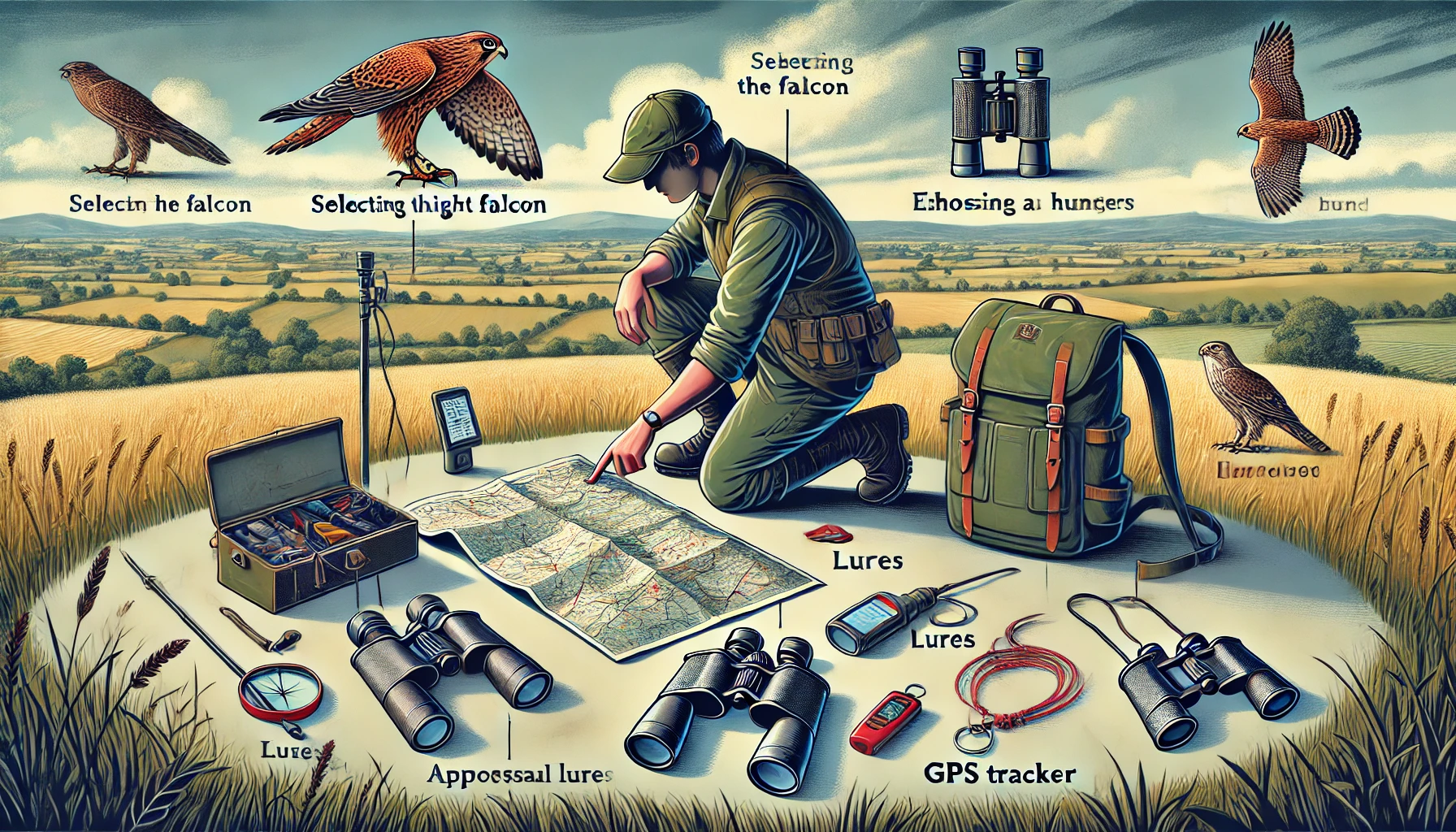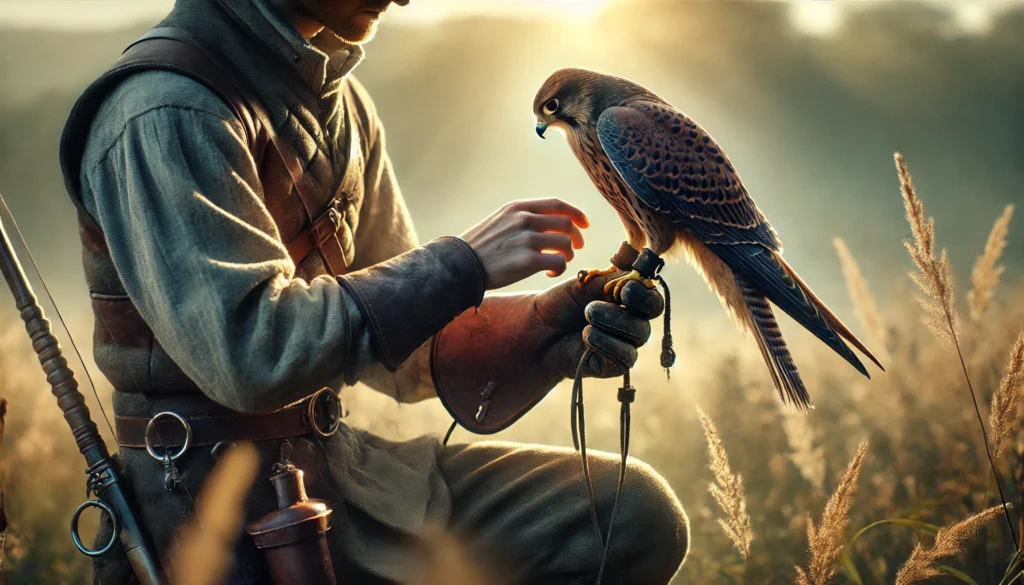Key Steps for Planning Your First Hunt
- Understand Falconry Basics: Learn the fundamental concepts of falconry, including the different types of birds of prey.
- Choose the Right Bird: Select a bird that matches your skill level and hunting needs.
- Get Proper Training: It’s essential to receive training from experienced falconers to handle birds safely.
- Acquire Necessary Permits: Ensure you have the required licenses and permits to legally practice falconry.
- Prepare Your Equipment: Gather all the necessary gear such as gloves, hoods, and telemetry devices.
- Build a Relationship with Your Bird: Spend time bonding and training your bird to follow commands.
- Scout Your Hunting Area: Research and visit potential hunting locations to ensure they are safe and suitable.
- Know the Local Wildlife: Familiarize yourself with the types of prey in your hunting area.
- Plan for Safety: Always prioritize the safety of both yourself and your bird.
- Practice Patience: Falconry requires patience and perseverance, so be prepared for a learning curve.
Your First Falconry Hunt: Think of It Like an Irish Pilgrimage
Hello, friend! Are you ready to embark on an adventure that’s been around since the days of knights and kings? Well, planning your first falconry hunt is a lot like preparing for a journey through the lush, green hills of Ireland. Just as you wouldn’t set off on a pilgrimage without your map, comfortable boots, and a plan, your falconry adventure requires careful preparation to ensure it’s as thrilling and successful as you dream it to be.
At Learn Falconry, we’re here to guide you every step of the way. Imagine this: you’ve got your magnificent bird of prey, your excitement is through the roof, but you might be wondering, “What do I do next?” Just like setting off on a well-planned Irish adventure, there’s both an art and science to making your first hunt a glorious success. And trust us, understanding the ins and outs of preparation can make all the difference between a frustrating flop and an unforgettable day out in the wild.
So, grab a cozy seat and maybe even a cup of Irish tea, and let’s dive into why planning is key. We’ll walk you through everything you need to know to make sure your first hunt is not just an activity, but an experience. From understanding the best time and place to hunt, to knowing what gear you’ll need and how to read the signs of your bird – every detail matters.
Your journey with Learn Falconry is more than just mastering a skill; it’s about connecting with history, nature, and an incredible bird that’ll soar through the sky under your attentive gaze. Stick with us, and you’ll be well on your way to making your first falconry hunt a story worth telling. Ready to get started? Let’s make this adventure as grand as an Irish tale!
How to Plan Your First Beginner Falconry Hunt
Planning your first falcon hunt can be an exciting adventure, but it requires careful preparation and understanding. Falconry is an ancient art that demands knowledge, patience, and dedication. Before embarking on your journey, there are essential steps to follow to ensure a successful and enjoyable experience.
Getting Started with Falconry for Beginners
Starting with falconry as a beginner involves understanding the basics. If you’re new to this field, it’s crucial to read up on the history of falconry. This will give you a glimpse into the rich traditions and practices that have been passed down through generations. Additionally, familiarizing yourself with essential falconry kit is fundamental before planning your first hunt.
Choosing the Right Falconry Bird for Hunting
One of the most critical aspects of planning your beginner falconry hunt is selecting the right bird. But what is the best falconry bird for hunting? Well, different species have varying skills and behaviors, making some more suitable for beginners. The American Kestrel is often recommended due to its manageable size and relatively easier training process. You can also explore other species of falcons to determine which bird aligns with your hunting goals and local regulations.
Essential Equipment and Legal Considerations
When planning falconry hunts, having the right equipment is paramount. Key items include falconry gloves, jesses and leashes, and portable falconry equipment. Additionally, staying informed about the legal aspects of falconry in your area ensures you comply with all regulations regarding bird handling and hunting permissions.
Training and Conditioning Your Falcon
Training your bird is a cornerstone of successful falconry. Start with basic training techniques to establish a bond and teach your falcon essential commands. Gradually, you can move on to teaching falcons to hunt, ensuring your bird is in top condition for the hunt.
Health and Nutrition
Just like any athlete, a falcon needs to be in peak physical condition. Understanding basic health care for falcons and ensuring a proper diet is pivotal. Regular check-ups and attention to parasite control help maintain your bird’s health and readiness.
By following these steps and using the resources provided by Learn Falconry, you’ll be well on your way to planning a successful and rewarding first hunt. Remember, patience and preparation are key to mastering the art of falconry. Happy hunting!
Beginner’s Guide to Planning Your First Hunt with Learn Falconry
Getting Your Permit and Sponsorship
Before starting your falconry journey, the first step is obtaining the necessary permits and finding a sponsor. Each state has its own requirements, but here’s a general overview:
Permit:
- Contact your state’s Fish and Wildlife Service to apply for a falconry permit.
- You’ll need to pass a falconry examination with at least 80% score.
- The permit costs around $40 and is valid for five years.
Sponsorship:
- Find a General or Master falconer who will act as your mentor during your apprenticeship.
- This sponsor will help guide you through the initial stages of falconry.
Setting Up Your Mews and Equipment
Proper housing and equipment are crucial for the well-being of your bird and your success in the field:
Mews (Housing):
- Build or purchase a suitable mews that meets your state’s regulations.
- Ensure it has ample space, perches, and protection from predators and the elements.
Equipment:
- Essential items include a glove, scale, jesses, leash, and swivel.
- These tools help you handle your raptor safely and effectively during training and hunting.
Apprenticeship: The Learning Phase
Your apprenticeship lasts about two years, during which you’ll gain hands-on experience:
Training:
- Learn how to handle and train your bird under the guidance of your sponsor.
- This period includes daily feeding, health checks, and practicing hunting techniques.
Bird Management:
- As an apprentice, you are allowed to trap a bird from the wild.
- You can keep the same bird for both years or choose to trap a different one each year (with permission).
Ready to Hunt: Preparing for the Field
Once you’re ready to start hunting, there are several factors to consider:
Hunting Permit:
- Ensure you have the appropriate hunting license for small game or general hunting in your state.
Hunting Seasons:
- Check your state’s falconry hunting seasons, as they vary and have specific regulations.
Choosing the Right Bird
Selecting the right raptor for your first hunt depends on your experience and target prey:
Harris’s Hawks:
- Suitable for beginners due to their cooperative nature and group hunting skills.
- Effective for hunting rabbits, squirrels, and birds.
Red-tailed Hawks:
- Ideal for apprentices because they’re easier to handle.
- Known for hunting small mammals like rabbits and squirrels.
Goshawks:
- Best for more experienced falconers due to their agility and determination.
- They excel in hunting small mammals and birds.
Steps to Advance in Falconry
Your journey doesn’t end once you complete your apprenticeship:
General Falconer:
- After two years, you can apply to become a General falconer.
- Requires approval from your sponsor and a review of your apprenticeship records.
Master Falconer:
- Requires at least five years of experience as a General falconer.
- You’ll need to demonstrate advanced skills and consistent commitment to the sport.
Table: Key Aspects of Falconry
| Aspect | Description |
|---|---|
| License Cost | $40 (valid for five years) |
| Examination Score | Minimum 80% |
| Sponsorship | Required (General or Master falconer) |
| Mews Requirements | Adequate space, protection, perches, following state-specific regulations |
| Essential Equipment | Glove, scale, jesses, leash, swivel |
| Apprenticeship Duration | 2 years |
| Hunting License | Depends on state (small game or general hunting license) |
| Popular Beginner Birds | Harris’s Hawks, Red-tailed Hawks |
| Experience Levels | Apprentice â General (2 years) â Master (5+ years as General) |
By following these guidelines and regulations, you’ll be well-prepared to embark on your first falconry hunt with confidence and respect for the ancient art of falconry.
Ready for Your First Falconry Hunt?
Planning your first falconry hunt might seem a bit overwhelming, but with careful preparation and a step-by-step approach, you’ll be well on your way to experiencing the thrilling sport. Here’s a quick recap of the most important points we’ve covered:
Obtain Permits and Sponsorship
To get started in falconry, it’s essential to obtain the necessary permits and find a sponsor. This includes licenses for hunting and specific falconry permissions, as well as having an experienced falconer to guide you through the process.
Prepare Your Mews and Equipment
Building or acquiring the right housing for your falcon and gathering essential equipment like gloves, scales, and leashes are crucial steps. Comfort and safety for your bird are top priorities.
Begin Apprenticeship
Falconry is a skill learned through practice and patience. An apprenticeship, usually lasting two years, allows you to learn handling and training techniques under the watchful eye of your sponsor.
Study and Pass Examinations
Before you can hunt, you must pass a falconry test to prove your knowledge and readiness. This is followed by submitting the necessary applications to obtain your license.
Choose Your Falconry Bird
Selecting the correct bird is vital. Whether it’s a Goshawk, Harris’s Hawk, or Red-tailed Hawk, your choice should align with your hunting goals and experience level.
Understand Seasonal Regulations
Different states have varying seasons and regulations for falconry. Ensuring you’re compliant with these rules will mean smooth and lawful hunting adventures.
By following these guidelines, you’re setting yourself up for a successful and responsible start in falconry. Happy hunting!



